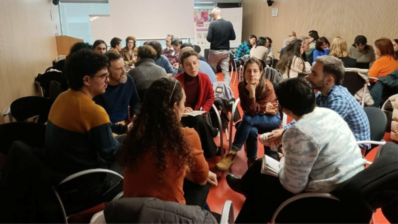People need communication to live in society. We need to know what others do and, often, adapt to them.
Our cells are no different. They also live in society, though within the human body. Therefore, cells need to know what is happening in other parts of the body. For this reason, they produce molecules that serve as messages in a glass bottle that other cells will capture with their antennas, known as primary cilia.
Aitor Mòdol, PhD student at the research group Function of the microtubules and cell division, led by Isabelle Vernos at the Centre for Genomic Regulation (CRG), explained in detail how this intercellular communication works. The talk by the young researcher, with a duration of less than 10 minutes, was framed within the first edition of the Biennal Ciutat i Ciència, an initiative that offered, through February 2019, more than 70 free scientific outreach activities in many different institutions of Barcelona, such as the Barcelona Biomedical Research Park (PRBB).
Video in SPANISH.






